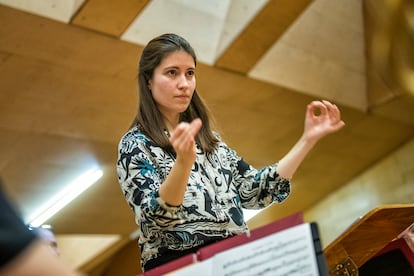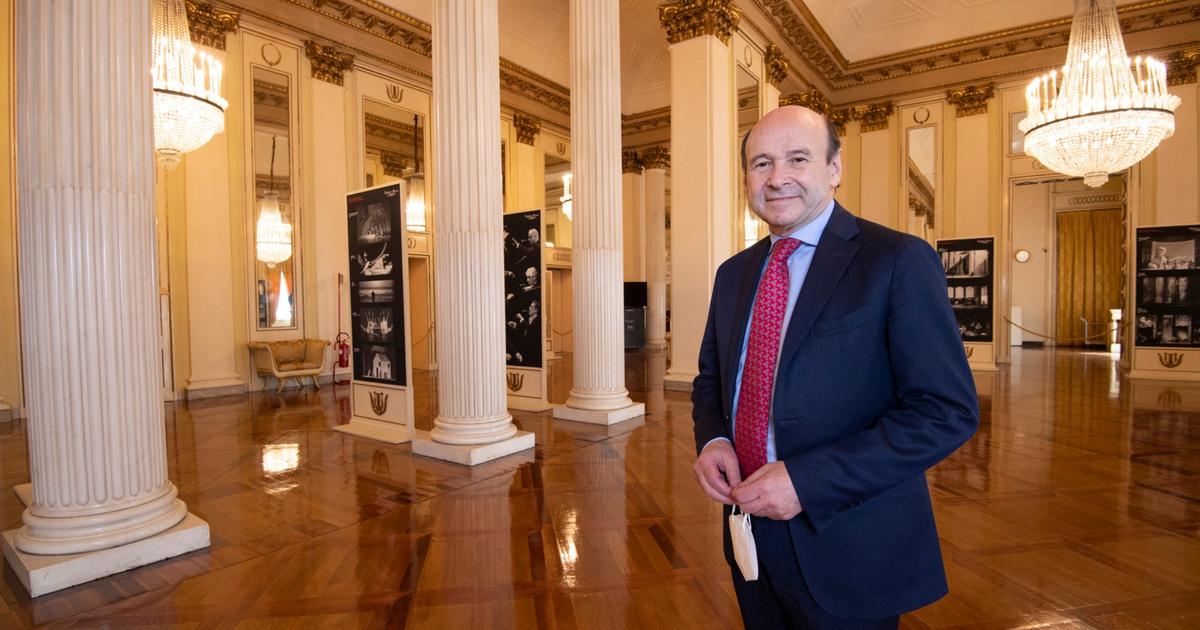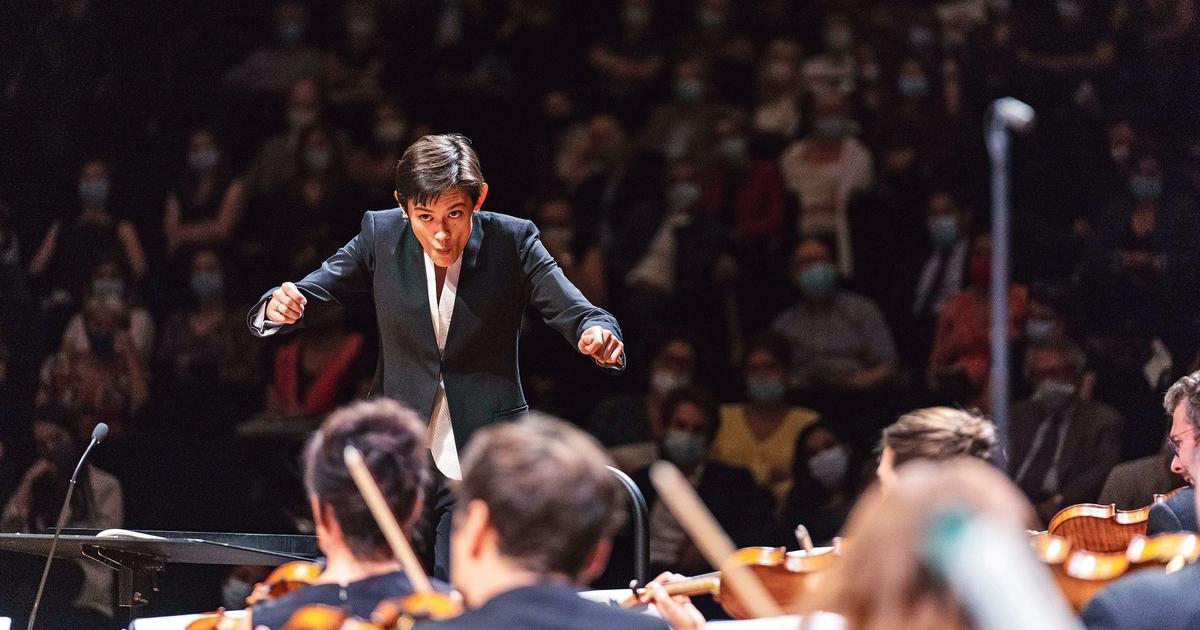"Someone who dares with Stravinsky even if this part is not polished?".
Undecided silence among the orchestra conducting students who attend the practical class at the Royal Conservatory of Music in Madrid.
When it seems that there will be forced instead of volunteers, Soledad Rubio stands up.
She is petite, serious, she faces the orchestra without a baton because this time she wants to see if she achieves other nuances with her hands;
although it is her look that gives forceful orders.
Rubio is in the fourth year, the last year of this specialty, and is the only woman in her class.
One out of five.
The usual proportion in the center.
Among the musicians in the orchestra, however, they are the majority.
More information
'Tár': Cate Blanchett, teacher, teacher or whatever they throw at her
Why do so few girls want to be directors?
"Don't know.
At the conservatory we have an orchestra full of women, they know what conducting is, they are watching it.
Here they usually come from other races and perhaps they love what they do more… I don't know.
It would be very incautious on my part to venture a hypothesis, but the truth is that it happens and everywhere”, explains Professor Juan Luis Martínez.
Rubio is his student.
Also Laura de las Heras, Marta Fernández and Verónica Sánchez.
They are the only women among the conducting students at the center.
All of them, boys and girls, number about 20 and most of them now attend this practical class.
Soledad Rubio, fourth year directing student.Claudio Álvarez
If it's not his turn to direct, Rubio listens seriously, hieratic.
Her back straight, her hair in a half-updo that clears her face, his arms at a perfect 90 degree angle and the sheet music in his hands.
Marta Fernández, sitting a few meters away, her long curly hair falls forward because she has her back arched and her chin tucked into her chest so she can read the sheet music on the iPad that she rests on her knee. .
So her hands can fly free.
Her music makes him jump in her chair and twitch the baton she wields in her right hand as if she were in magic class.
Each one understands music in her own way and the four students fell in love with conducting in different ways.
But there are commonalities.
All admired only male role models.
Everyone is now looking at the career of the Mexican Alondra de la Parra.
And no one has heard that conducting is not a women's business.
Nor does any of them know that Alondra de la Parra has had to listen to it.
“When I told friends of my parents that I wanted to be an orchestra conductor, the immediate response was: 'But you can't because you're a woman.'
And they did not say it with a bad vibe, it came out at that moment ”, recalls the Mexican director by phone.
She says that when she decided on the direction the idea sounded "very crazy", because there were no female references.
She found her own way and over the years she has become a model for other generations.
Her name was even recently considered to direct the National Orchestra and Choir of Spain, although she eventually renewed her contract with David Afkham.
She has been able to, but that “you can't” has also been present in her career and she has felt it without having to hear it: “The important thing is how many people she said it in her mind.
That is impossible to know, but she does feel it ”.
Professor Juan Luis Martínez gives instructions to the student Verónica Sánchez.
Claudio Alvarez
De la Parra has experienced bitter situations, such as finding out that another colleague has been paid more.
It has happened to him on several occasions, but he gives details of one of them.
“It did infuriate me, especially because it was an orchestra that had wanted to work with me for years, invited me and asked me to suggest the soloist”.
The director was offered an amount that seemed somewhat low.
She tried to make it more, but the orchestra refused: under no circumstances could they improve the offer, that was the way it was by statute.
De la Parra accepted and over time she found out that the soloist did get paid more than her.
“A soloist that they didn't know, that I recommended… How can it be that they could make an exception there and not in my case?”.
Equality, the director believes, is still far away: "We are not even halfway through the change, we are still at the beginning."
And she has no answer to why there are so few young people who want to study directing.
It has a lot to do, adventure, with the fact that it has always been a profession for men.
And she points out another possible reason: “It is not easy at all to carry out this career as a mother.
If you want to be a mother and a director, I would say that it oscillates between the impossible and the very impossible ”.
She took her children on her tours of the world's orchestras until they were six years old.
But the expenses of the transfer were borne by her.
“Those six years, 80 or 90% of what I earned was spent paying to take my children,” she says.
Virginia Martínez found it easier.
Her maternity coincided with her debut as head of the Murcia Region Symphony Orchestra.
“The ownership of it was given to me by two men and they trusted me when I was eight months pregnant.
I joined two months after giving birth because they gave me everything I asked for: a dressing room to have my baby with a cradle, my mother to be there and I to be able to breastfeed there.
Then my other daughter was born and my dressing room was still full of nappies and mixed scores”, recalls the Murcian director.
She knows that the situation is not one of parity and that other compañeras have suffered the scourge of machismo.
But she has only had two bad experiences and both by women.
One of her, she remembers, she blurted out in her face that she couldn't stand a woman leading her.
If there have been more looks, gestures,
Students who make up the orchestra of the Madrid Royal Conservatory of Music.
Among the musicians, they are the majority.Claudio Álvarez
In Spain there are 35 symphony orchestras (included within the Spanish Association of Symphony Orchestras) and only two of them have a woman as chief conductor.
Martínez in Murcia, where she has been for more than ten years, and Marzena Diakun, director of the Orchestra and Choir of the Community of Madrid since 2021, who did not want to participate in this report.
The percentage is low and Martínez believes that the path to equality is to increase it: “The most powerful weapon that we directors have is to get on a platform.
It is the most valid hope that girls who are starting out can have, a way of telling them that dreams can be achieved.
If they don't see it, they won't believe it.
Alondra de la Parra is an excellent conductor or Marin Alsop, head of the Vienna Radio Symphony Orchestra,
but it is also important to have something closer to the people.
Having a female director in the orchestra of a city greatly favors that this conservatory increases the number of women in its conducting students ”, she defends.
As an example that you have to fight from normality, the director says that her daughter was interested in a score that she was studying.
They searched for the piece on YouTube so that he could listen to that music and chose the first result: Valeri Guérguiyev at the Mariinsky Theater in Saint Petersburg.
“Her first reaction from her was: 'Wow!
A man directing?
How odd!'
Of course, she has seen me all her life.
Normality is what we associate with our day to day”.
Soledad Rubio, fourth-year orchestra conducting student at the Madrid Royal Conservatory of Music.Claudio Álvarez
Marta Fernández, third-year orchestra conducting student at the Madrid Royal Conservatory of Music.Claudio Álvarez
Verónica Sánchez, third-year orchestra conducting student at the Madrid Royal Conservatory of Music.Claudio Álvarez
Professor Juan Luis Martínez gives instructions to Soledad Rubio during a class.Claudio Álvarez
Marta Fernández follows the score during the practical class together with other conducting colleagues.Claudio Álvarez
Several directing students.
Of the nearly twenty students in this specialty at the center, only four are women.Claudio Álvarez
Musicians of the orchestra of the Madrid Royal Conservatory of Music.
Here, they are the majority.Claudio Álvarez
The student Verónica Sánchez directs the orchestra.Claudio Álvarez
Marta Fernández conducting the orchestra at the Madrid Royal Conservatory of Music.
Claudio Alvarez
Martinez mentions Marin Alsop, a pioneering American director in many of the steps that remains committed to reducing the gender gap.
In 2003 she created the Taki Alsop Scholarship to support young female directors.
And in 2022 Irene Delgado-Jiménez and Julia Cruz became the first Spaniards recognized by the foundation.
Delgado-Jiménez, born in Algeciras, was appointed associate member for the period 2022-2024.
“This program changes the world.
Now it's fashionable to invite women because you have to fill a quota, but we don't really support them.
Marin gives that scholarship so that we don't have to go through certain ordeals.
She hallucinates that it still happens.
The problem is that it still happens.
It has been first in many things, but it doesn't change as much as it should.
And there is always the danger that she will go backwards, ”she tells her via zoom from Vienna.
The three directors also take the opportunity to make a plea: they want to talk about music.
That, like them, they are asked about their projects, their concerns.
De la Parra only remembers one interview, in her entire career, in which the issue of equality was not present.
And when she finished she was so grateful that she hugged the interviewer.
Martínez knows that it is part of her responsibility and Delgado-Jiménez is exhausted by always responding to the same thing.
“When the questions are addressed to us as victims of a system, I end up very tired.
If the questions create some kind of hope, then it's different.
Listening so many times that you don't live equally is very hard.
I don't know if they'll stop asking me about it.
Maybe it won't happen or maybe one day I'll decide not to do these types of interviews.
Say this far I have come.
But I don't know if I can afford it either."
The first solution then, for the director of Algeciras, is because being a woman stops being news.
The second, she continues, for giving them real support.
And of course they don't help, she thinks, movies like
Tár,
starring Cate Blanchett and Oscar nominee.
01:34
Tar Trailer
Trailer for the film Tár, starring Cate Blanchett.
Tár tells the story of a successful director in such a present time that she even mentions the pandemic.
But any resemblance to reality, as far as equality is concerned, seems coincidental.
The female directors do not sign with Deutsche Grammophon (Mirga Gražinytė-Tyla became the first and only in 2019), they do not have interesting interviews in which it is obvious that they are women and their way of understanding music or their present and future projects take precedence. .
And it doesn't seem that Marin Alsop believes that it's time to open her scholarship to both sexes, as the film's protagonist, who manages a similar project, does.
Perhaps that point should have been reached, but the reality is different.
The situation of the directors has improved, but they report that the pace is slow.
They continue to be a minority leading the orchestras and among the students.
There are still few female references to look at.
They keep having to listen to the president of the Vienna Philharmonic say that there are no women prepared to conduct the New Year's Concert.
Steps forward have been made and should be celebrated, but what the directors are now demanding is that the tempo stop being slow and become
allegro
.
Subscribe to continue reading
Read without limits
Keep reading
I'm already a subscriber








